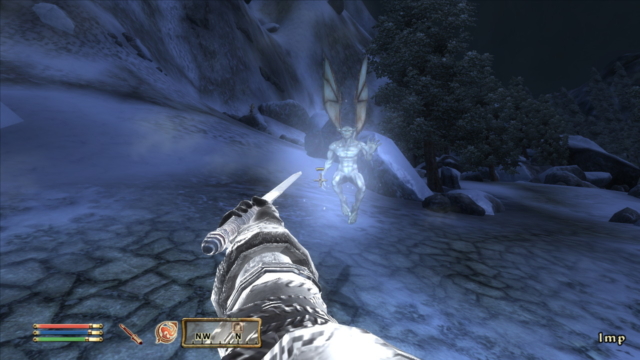
The Elder Scrolls IV: Oblivion
Written by: Rik
Date posted: September 24, 2017
- Genre: RPG
- Developed by: Bethesda Softworks
- Published by: 2K Games
- Year released: 2006
- Our score: 9
The Elder Scrolls: Morrowind is one of Stoo’s all-time favourite games. During his write-up, he was moved to remark that even I had bought a copy, which left open the possibility that I would one day come to recognise its charms. In the end, I played it for, ooh, about seven minutes, long enough to admire some of the scenery and become overwhelmed by the stats, the big chunks of text, and the choices ahead. To be frank, I made a surface-level assessment that it probably wasn’t for me, but resolved to maybe give it another try some other day. Any gamer overburdened with big piles of unplayed games will be able to guess whether that happened or not.
And so, to the sequel, Oblivion. Recent 10-year anniversary retrospectives settled on a consensus that it wasn’t, perhaps, the most fondly remembered of the series, a position that my good friend and colleague largely went along with, while confirming that he was unlikely to revisit the game any time soon. It seemed like a decent opportunity for me to make another attempt to get into this kind of thing, especially as I had already acquired the game in a Steam sale via the mobile app in a fit of drunken Christmas enthusiasm.
Even if I was prompted to do so by the moderately unenthusiastic evaluations of cynical and battle-hardened RPGers and my own slightly contrary nature (and I was), there’s always a danger in knowing too much in advance, so I was keen to avoid reading detailed critiques before I was able to draw my own conclusions. Still, I had been aware of off-putting statements that are often thrown around when large and complex games are discussed by enthusiastic and well-meaning fans, like “this game is completely unplayable without mods” and “the levelling system is totally broken”. My own slightly naive position on such statements is usually to take them with a pinch of salt, reasoning that any game that receives such widespread acclaim and continues to have a significant following must be largely ok in its vanilla state, with any serious or major bugs ironed out by official patches in the interim.
(This is not to say that there aren’t any glitches, or to denigrate the efforts of the dedicated and hardcore enthusiasts, without whose help in putting together detailed FAQs on the game I would certainly have come unstuck at certain points.)
As in Morrowind, you begin the game as a prisoner. This time, your cell-dwelling is interrupted by the unexpected appearance of the Emperor, Uriel Septim (who sounds a lot like Patrick Stewart), who is on the run from assassins and urgently needs to get through to the secret passageway in your cell. Given the circumstances, you’re unexpectedly pardoned for your crimes and end up joining the Emperor in making his escape, fighting off the assassins, and grabbing a few bits of equipment from dead bodies into the bargain. This extended prologue/tutorial also serves as part of the character creation process: having already selected a race from the 10 available, each of which comes with natural skill boosts and unique abilities, how you play during this section allows the game to match you to a preselected character class.
This is generally how the character system is supposed to work – rather than focusing on stats, simply playing the game in your chosen manner is supposed to mould your character appropriately. You do have one further opportunity to change your mind before you begin the game proper, and of course those who prefer to tinker with a custom class can also do so, choosing seven major skills, improvement of which will cause your character to level up and receive boosts to your overall attributes.
If you’re anything like me (which you probably aren’t, if you’re into RPGs) all the talk of races, classes, skills, attributes and levelling up can seem a bit baffling at first, even though both the game’s manual and the various in-game help pop-ups explain things pretty clearly. But, just as your character develops over the course of the game, so too does your understanding of how all the background stats fit together. At which point you might start regretting some of your choices and want to go back in time and start again.
My two natural areas of uncertainty at the outset were: a) how do you know what skills you want when you haven’t played the game and don’t know how useful they’ll be and b) is there a way to just be good at absolutely everything. (The second one is a bit silly, I know – I do realise this is not how it’s meant to work). What I really want to avoid is investing a lot of time, only to find that the character I’ve created is somehow too crap at the things I later find I want to be good at, or that the particular combination of skills I’ve chosen actually means that the character is ill-equipped to make significant progress overall. Fortunately, I avoided either of those scenarios in Oblivion, although I understand that there are ways in which you could get into difficulty (more on which later).
Anyway, with all of the initial choices out of the way, you find yourself in the province of Cyrodil, which light internet research tells me is part of the larger world of Tamriel, the setting for all Elder Scrolls games thus far. You can either pursue the main quest, following on from the events of the prologue/tutorial segment, or explore the world a little. Or explore the world a lot. As we’re in game land, the apparent urgency of the main quest can be safely ignored until you’re ready to trigger events that move it forward. And so this is how, several hours after an emotional Sir Patrick was imploring me to take the Amulet of Kings and find his last son and heir, my character was to be found sploshing around in a lake trying to kill fish with a sword. (Spoiler: the heir to the Empire was not in the lake).
Normally, I’m keen to get on with things, viewing the main quest as the main objective, and anything else as largely pointless busywork: dull chores which you may choose to grind through in order for stat or equipment-based rewards. However, this wasn’t the case with Oblivion, which has such a rich open world to explore that to not do so would be kind of missing the point. In fact, Oblivion is the opposite of open world games where the main quest feels fundamental and the side quests dull padding: here, it’s the other way around.
Each of the 9 major towns and cities has its own stories, personalities and politics, and you become drawn into the tale of the local weirdo, the suspected vampire, the weird noises coming from a house or the woman who can’t pay her missing husband’s debts. Each quest has its own surprises and twists, and sometimes you don’t really realise that what you’re doing is a quest until you’re right in the thick of it (spending a night at the Bloated Float Inn, for example). And that’s before we get into the various guilds and their associated storylines and rewards, or the matter of simply exploring, blundering into a cave or fort in search of baddies to kill and goodies to collect.
On the other hand, the main quest is difficult to engage with. Where there is a human element to many of the smaller stories, the main one is drenched in the kind of epic fantasy language that just completely goes over my head. Essentially: the lack of an heir for Emperor Septim has allowed baddies and beasties from another realm (Oblivion) to enter Cyrodil via a number of portals, each of which must be entered and closed from the inside. The heir to the Empire is, it turns out, his illegitimate son Martin, voiced by Sean Bean (in full Alec Trevelyan mode). Martin is largely from the Nicole from Broken Sword school of thought when it comes to solving problems, in that quests often involve him sitting around reading a book while you go off to do something dangerous (like actually closing the gates).
You don’t have to enter each and every portal to finish the game, but once you trigger the main storyline by visiting the first one at Kvatch, they’ll keep popping up at random, spewing hell beasts into the countryside, until you do. Seeing a gate for the first time, it all feels fairly dangerous and epic, particularly once you venture inside and find yourself in the fiery planes of Oblivion, confronted by new and dangerous-looking foes, but after a while it all gets kind of tedious and repetitive. In time, each gate comes to feel like the rubbish end bits of one of those late 90s FPS games where fleshy humans seem able to wear several blasts from a rocket launcher.
Because of this, combined with a combination of genre ignorance and simply forgetting myself, I often found myself playing Oblivion like an FPS. That I failed to take into account the stats and dice rolls going on in the background is probably a testament to the combat system, which I understand is much improved from Morrowind. My character was reasonably competent with a blade, and swordfighting did feel mildly strategic, with the timing of strikes and blocks at the right time seeming to have the desired effect, although I will admit that at times I did pine for the kick function and dangerous scenery from Dark Messiah of Might and Magic. And of course, it does ultimately help to actually pay attention to all the stats boosts given by magical items and armour before going into battle.
If such things don’t come naturally to you initially, it is the kind of thing you can pick up as you go along, and navigation of the initially complex system of menus soon becomes second nature. Elsewhere, there are mini-games for conversations and lock-picking, which time hasn’t judged kindly, but I quite liked them, even though the conversation system is weird and effectively means you stand in front of someone shouting jokes and compliments at them repeatedly while whispering boasts and threats until they like you as much as they’re ever going to. (See Skills to pay the bills for more)
Levelling was the subject of moderate controversy at the time. In time-honoured RPG tradition, by developing major skills, you increase your overall level and stats. But in Oblivion, the enemies are scaled to match your abilities. So a cave might have a few puny trolls in it early on, but return there as more of a higher level hard-nut and you’ll find bigger, nastier beasts in their place. Travel the roads of Cyrodil as a wimp and you’ll face similarly weedy bandits, but later on they’ll come at you with glass weapons and magical armour.
The positives of such a system are, in theory, that you really can go off and do what you like without spending hours hacking up rats in a cave first. On the other hand, though, if you make certain choices regarding your major skills, your character may not be capable enough in combat to deal with levelled-up enemies. I made sure that I would be proficient in combat and largely put the issue out of my mind, and it was generally ok, although at higher levels, it would have been nice to have some puny foes to slice through, and not be chased by multiple bears any time I went for a walk. One of my main regrets was not paying sufficient attention to upping my agility attribute, which meant that, despite being handy with a sword and armour, my character was knocked off balance rather too easily for my liking.
If you’re so inclined, you can read up on tips to ‘beat’ the perceived deficiencies in the levelling system, for example by choosing skills you’ll rarely use as your major ones. I personally didn’t find such tactics to be necessary (just as I didn’t want to follow the oft-repeated advice to level up certain skills by standing in a field and using them repeatedly) but there’s plenty of detailed information out there, if you want to use it.
The environment was also the subject of some criticism for being too generic and green compared with the more otherworldly environs of Morrowind. I guess it depends how much generic fantasy you’ve been exposed to: historically, I’ve tended to run screaming from such things but they seem altogether more palatable these days. (I guess Game of Thrones might have something to do with it). I kind of like an olde worlde society, as long as the magic and mystical elements aren’t too pervasive (and the language used isn’t too twee and flowery), and that’s largely what we have here.
Whatever your feelings about them in theory, there’s no denying that the lush greenery and shimmery lakes do look pretty amazing. I’m not normally one for wandering around in games just taking in the view, but I found myself doing so here (although I did also make use of the ‘fast travel’ feature, which allows you to whip straight off to your desired location, as long as you’ve been there before). As previously mentioned, I’m sure that there are mods to make it look even nicer, but I found it all perfectly acceptable out of the box: the only real criticism would be the occasional pop-up of bushes and shrubbery which no amount of tinkering with settings seemed to eradicate.
I’d also say that having such an idyllic setup with beautiful scenery creates a greater contrast with the realm of Oblivion. When the two worlds collide, gates start opening up and bad beasties spill into Cyrodil, it does sort of emphasise the threat posed by the unfolding events of the main story. Even if you aren’t really listening when various characters explain to you the gravity of the situation, the darkening and reddening of the skies, accompanied by a roll of thunder, whenever you’re near an Oblivion gate, does create an appropriate sense of dread.
When people criticise the Elder Scrolls games for sameyness, I always think of the PC Zone review of the second game, Daggerfall (for more on which, see Brooker’s Daggerfall downfall) and wonder whether, for all their technical advancements since then, the same could still be said now. I personally felt that each town did have distinctive feel, from the shabby charm of Anvil, to the snowy peaks of Bruma, or the slightly snooty Leyawiin. And if you spend some time in each, doing the little quests, you really do start to get a feel for what they’re all about.
And each place will be a hive of activity, with characters going about their daily business, talking to each other, and to you. The static nature of NPCs was a feature of Morrowind but it seems to have been addressed here. During the day, shops are open and people are milling around; at night, everyone’s in bed and doors are locked. You won’t be able to tell an important character from a generic one purely from whether they use speech or text to speak with you, either: everyone is fully voiced.
Being a shallow sort, I’m entirely in favour of such a move, although there is a price to pay: the inhabitants of Cyrodil do look and sound pretty similar. For the time that you’re engaged in a quest involving a particular character, or set of characters, they all seem like individuals rather than templates, but as soon as you’re done, any memories involving them quickly fade away. I think I’m right in saying that the NPCs aren’t as numerous as in Morrowind, so the towns could seem comparatively sparsely populated. Having not played Morrowind, I didn’t really notice this to be the case, although there was one moment, during the build-up to a climactic battle, where it felt like the turnout from the locals might have been appropriate for the pub football team, rather than a bunch of guys who were supposed to be going off to try and save the world.
As you wander around a town and overhear various conversations, you’ll soon realise that they aren’t the most organic and convincing sounding, while any remarks directed at you soon become fairly repetitive (and if you’ve beefed up your character somewhat, you might find yourself on the receiving end of some fairly camp-sounding compliments from the town guard: “look at the muscles on you!” or “I heard you know how to move in light armor!” *snaps fingers* Honey, you should see me move with my armour off). But, for me, it’s better than static characters and text conversations. There are, of course, plenty of moments where things don’t quite work: for example, I was tasked with breaking into someone’s house in the middle of the night and accidentally got the wrong door but then was greeted warmly by the owner of the place I was inadvertently burgling. I imagine if you really start messing around there are all kinds of oddities to uncover.
It’s been eleven years, so I guess few of my observations will be new. The main criticism I’d agree with is that the central quest is a bit dull: closing the gates turns into a bit of a slog, and the story didn’t interest me at all (I zoned out during one of the big bad guy’s final speeches and realised I was listening only out of a learned sense of duty to stories in gaming and wondered if I could/should have just sliced him up before he finished explaining exactly why he was doing whatever it was he was doing). Although I did still have a sense of wanting to complete it: perhaps I’m just not good at ignoring the main thrust of the story, or maybe it wasn’t all that bad, I don’t know. It was kind of worth it in the end, although the grand finale struck me as rather silly and involved a lot of running away in a vaguely comical fashion, before an admittedly spectacular end scene.
Even as I determined to focus my attentions finish the main quest, though, I kept being distracted by various other, relatively trivial, local concerns. The pull of the numerous small quests really is Oblivion’s great strength, and it’s rarely about what cash, armour or rewards you might get: it’s usually about just going off on a bit of an adventure and finding out what happens. Stoo has talked in the past about those games where you begin a session planning to do just one thing, but then as the evening unfolds you end up getting completely sidetracked, and that’s certainly the case here. Just an hour more, just one more quest.
I don’t play a lot of RPG games, and in the past I’ve been keen to push the “Rik plays an RPG” angle, as if they were some kind of niche interest that a clueless oaf was dabbling in. Clueless oaf is still about right, but in reality all recent Elder Scrolls games have had significant mainstream appeal. Just because I haven’t played a game like this before (and may never find the time to do so again, although I’d like to) doesn’t mean they haven’t been enjoyed by millions without anyone making a big deal of it.
I guess it does mean my terms of reference are narrowed somewhat, and I’m not really qualified to evaluate Oblivion alongside the other games in the series, so make of that what you will, although I have played another RPG from 2006 in the form of Dark Messiah of Might and Magic which, although shorter and more accessible than Oblivion, actually seemed like more of a drag to complete. Another point of comparison would be Test Drive Unlimited, the CARPG which, similarly, gave you a world to get lost in and cultivated, over many enjoyable hours, an obsession with collecting cars, mansions and, er, Ben Sherman clothing vouchers.
Oblivion does have some faults, but it seems churlish to dwell on them when you consider the many hours of enjoyable questing its world provides. Despite being mildly fatigued by the main storyline and choosing to give the game a bit of a rest for now, I’m certainly tempted to go back to it at some point and revisit the Knights of the Nine and Shivering Isle add-ons (not covered here), or maybe even start again as a new character. I guess you could say that I’ve been won over, and beyond that, there’s little more I want to say, other than to offer a wholehearted recommendation.

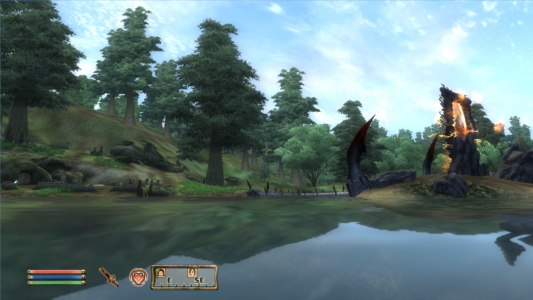
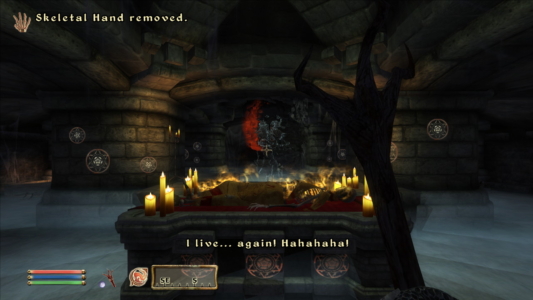
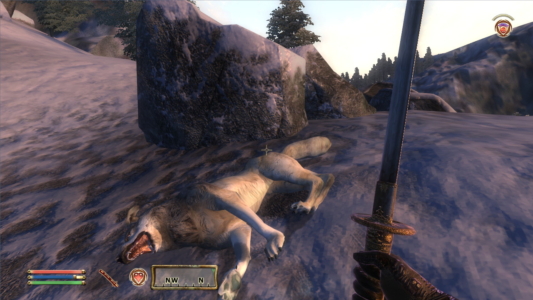
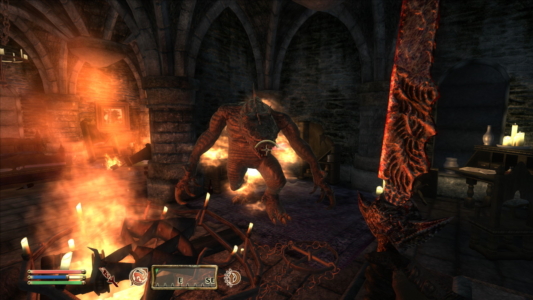
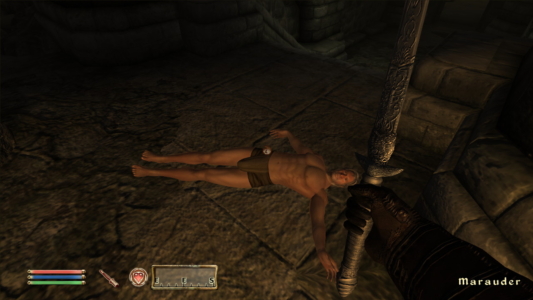
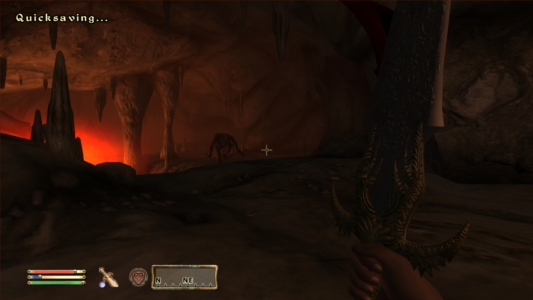
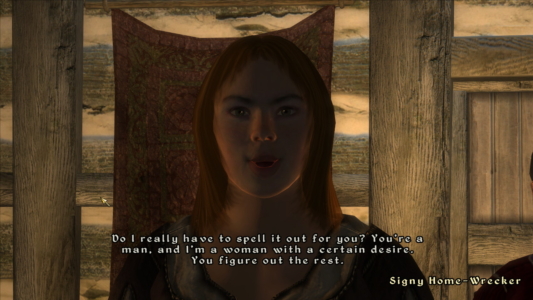
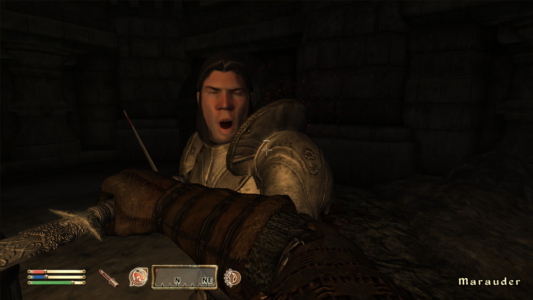
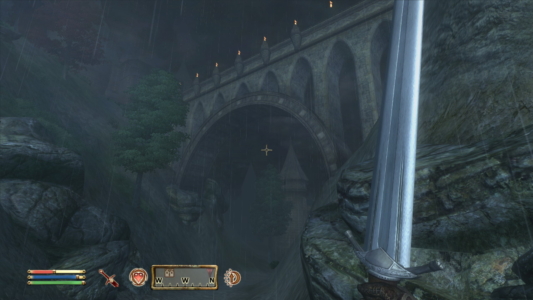
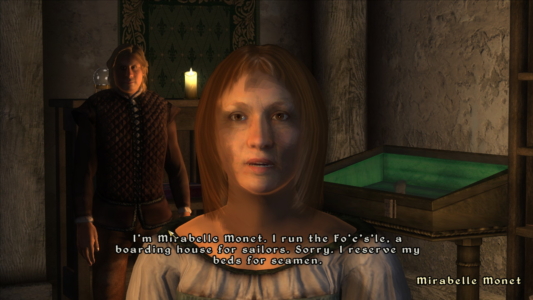

 Posts
Posts
Oh, Rik, if you loved Oblivion (and it seems you loved it as much as I do), you owe it to yourself to give Shivering Isles add-on a go, it’s just brilliant.
October 8, 2017 @ 7:34 am